(This is the first of a two-part article prepared by our Russian friend Comrade Aleks.)
We are used to horror lyrics in metal and especially in extreme metal music. Different reasons push different bands to write about it, and I’ll let someone else write about that who knows this topic better than I do. Today I have for you a compilation of tracks dedicated to World War II, mostly to the Eastern Front. 70 years ago the War ended, and today there is still a lot of discussion born in Russia, the East, the EU, and the USA about how it truly was, and how it could have turned due to some specific circumstances. I will not tell you my point of view — but just provide brief historical excursions, music, and sometimes the comments of death, black, and doom bands about it.
Here you will find exclusive detailed comments from Martin van Drunen of Hail of Bullets and some stories by participants in Skyclad, Altar of Oblivion, Mental Home, Eastern Front, Dark Lunacy, and Sodom.
Why the Eastern Front? Because a damned lot of things happened here, sooth to say. My grandfather was recruited in January 1943. He was 17 years old, and German aviation had bombed his village near Leningrad / Saint-Petersburg. He took part in breaking the Leningrad siege and in a Finnish company where he was wounded. The War touched nearly every family here, and we must remember. I’m thankful for all these bands who remind us about it.
“A man cannot realize that above such shattered bodies there are still human faces in which life goes its daily round. And this is only one hospital, a single station; there are hundreds of thousands in Germany, hundreds of thousands in France, hundreds of thousands in Russia. How senseless is everything that can ever be written, done, or thought, when such things are possible. It must be all lies and of no account when the culture of a thousand years could not prevent this stream of blood being poured out, these torture chambers in their hundreds of thousands. A hospital alone shows what war is.”
Erich Maria Remarque, All Quiet on the Western Front
Evil born unnoticed
We must remember how Fascism was born. How did it happen that whole nations “turned to evil”. Have you heard about the classroom experiment called “The Third Wave” by Ron Johnson? Damn, how did it really become real? The great poet and frontman of the criminally underrated British thrash band Skyclad, Martin Walkyre, has raised this topic twice in his songs: First, it was “Schadenfreude”, and then “Gammadion Seed” on the album Prince of the Poverty Line. Witty and sharp as usual, his lyrics point to something very similar, to something that sometimes we have seen not only in Germany of the ’30s.
The devil’s circus came to town – we watched the freaks arrive en masse
When they paraded through our streets, we turned a blind eye as they passed
Safe in the comfort of our homes we all forget the need to fear
This is the new “new Jerusalem” and it could never happenFive years pass by – unnoticed change, their glamour has us in it’s grasp
But now the walls have eyes and ears – questions too dangerous to ask
New state controlled T.V. and press – for reasons suddenly unclear
This is the European dream so nothing bad can happen.
Skyclad – Gammadion Seed
Rise of Evil
Altar of Oblivion (the epic doom metal outfit from Denmark) have a conceptual album, Sinews of Anguish – Opus 1 in D-Minor. The band’s mastermind Martin Meyer Mendelssohn Sparvath (guitars, keyboards) tells the storyline of his debut:
Sinews of Anguish… is the story of a young German soldier who fell during 1942 on the Eastern Front under the order of the ruthless attack on the Soviet Red Army. Initially, elated speeches by Nazi propagandists and the blinded apparent superiority of Hitler’s military staff made people believe in a quick German victory. Anyway, time passed, the losses of the army only increased, and the protagonist begins to lose faith in the numerous promises given by the leaders of the Third Reich, gradually coming to the realization that German victory was a product of delusional, fanatically Mad Visions. Although he realizes the true intentions of the Nazi regime, he sees that everything has gone so far that he has no choice but to fight to the bitter conclusion.
The band’s name is also tied to one aspect of World War II — it is literally the altar, which can be a battlefield where soldiers and civilians were sacrificed by their leaders, who could not stop on the way to achieving their goals. Forgotten were the many lives absorbed by the horrors of war. It is possible to draw a parallel with how much today is also sacrificed by censorship, dogmatism, and social pressure — it is still widespread.
Altar of Oblivion – The Final Pledge
Martin continues:
Germany invaded Russia in the early summer of 1941, and caused enormous damage in all areas, and your country paid the highest price — more than any of the countries participating in the war. Denmark, however, lost to Germany in a few hours, to avoid casualties among the soldiers, but even that short token resistance was necessary to demonstrate to the rest of the world their disagreement with the German course. Since Hitler proclaimed all Scandinavian ancestors Aryan people, the Danes were allowed to live a relatively quiet existence, while other countries occupied by the Germans frequently experienced bloody purges.
My maternal grandfather was born in 1918. He was in his early twenties when the Germans invaded Denmark in April 1940. When they needed a work force for the construction of bunkers on the Danish coast, my grandfather and his comrades were involved in the construction of fortifications. And yet, they did their best to sabotage the work — disappearing tools, breaking equipment. Due to this, work was slow, but the Germans did not suspect anything serious. The workers added sugar in the cement, making it brittle and preventing the strengthening of fortifications. But when sugar was scarce, these methods could not be widespread. Unfortunately, my grandfather never talked about what had happened to him during the war. The little that I know, I heard from my mother.
My paternal grandfather, despite the fact that he was quite a reserved man, told me something. In 1944, a Britihs fighter crashed near his farm. His grandfather and his friends rushed to the crash site and pulled the pilot from the wreckage. The pilot survived, although he was seriously wounded, and hid on a farm. But the Germans still found the pilot and he was taken to a hospital. Grandfather said that the German soldiers based in Denmark were very friendly and most of them just wanted to go home to their families”.
Partisans’ resistance and General Winter
One of the best albums dedicated to events that took place on the Eastern Front is Hail Of Bullets’ …Of Frost And War. Martin van Drunen, the band’s vocalist, was kind enough to give me a detailed description of some of the album’s aspects.
As a boy I discovered the book Stalingrad by Theodor Plievier, and I was fascinated by this dark but pure novel about this WWII episode. So from there on I wanted to learn more and started collecting history books and Eastern Front novels. Perhaps Stalingrad became a bit of an obsession. But it automatically triggered my interests for the whole Eastern Front. The German offensive, the ferocious fighting, and the first stand of the Red Army at Moscow. The incredible tragedy and massacre at Leningrad. And then of course Stalingrad followed by the tank battle at Kursk.
Now here in The Netherlands at school we do learn a lot about WWII, and a part is about the Eastern Front. But it’s more focused on the Normandy landings, the holocaust, and how everything could politically rise up. But I was shocked to read about the intense brutality, the slayings, and the exorbitant amount of casualties, both civilian and military, in Russia during that war. And that without the Soviet fighting, fascism could never have been beaten.
So when we started Hail of Bullets, I explained to the band that I wanted to create a concept album about the events that took place on the Eastern Front, and they thought it was a marvelous idea. The music turned out to be dark, heavy, and filthy, just like that part of the war was. So we were all pleased we succeeded in making an album that told briefly the story of how Russia won its war.
In the end I can say I chose that concept as, in my opinion, still much here is unknown and we should grant the Russian soldiers and people who gave their lives more of our gratitude.
It was an obligation that when I was in Moscow I could pay honour and respect at the monuments of Stalingrad and Leningrad in remembrance of the fallen.
Hail of Bullets – Advancing Once More
A brief remark (quoted from here) about partisan resistance before Martin speaks again…
The Soviet partisans were members of a resistance movement that fought a guerrilla war against the Axis occupation of the Soviet Union during World War II. The movement was coordinated and controlled by the Soviet government and modeled on that of the Red Army. The primary objective of the guerrilla warfare waged by the Soviet partisan units was the disruption of the Eastern Front’s German rear, especially road and rail communications. There were also regular military formations, also called partisans, that were used to conduct long-range reconnaissance patrol missions behind Axis lines from bases within Soviet-held territory. The partisans’ activities included disrupting the railroad communications, intelligence gathering and, typically, small hit and run operations.
Hail of Bullets – Red Wolves of Stalin
Martin van Drunen:
“Red Wolves” is a song dedicated to the Russian partisans who afflicted the Germans in the rear of their lines. I chose wolves, as they lived in the forest and attacked like these great and beautiful predators. Red, as of course it was Russia’s colour. Many people forget how important their raids were, cutting the Germans off from their supply lines, and also dealing out severe blows to German morale. An album about the Eastern Front is, in my view, not complete if the partisan war is not mentioned.
Ideology is another thing. Actually, it was two dictators opposing each other, but Hitler was the aggressor. Fortunately, Stalin was smart enough to call out that it was a war against Mother Russia itself, and so the population was not fighting for Stalinist ideology any more, but against the fascists who wanted to conquer and enslave the Russian people. And he gave his marshals and generals freedom in strategy and tactics, which was surely also important for the final victory.
But it was a clash between two totalitarian ideologies, both inhumane. There’s just a difference if you fight thousands of miles away from home for a bad cause or defend your very home ground or motherland.
Or in other words, as a Russian farmer said: “Stalin at least left us our last cow. The Germans even took that away from us”.
Hail of Bullets – General Winter
Martin van Drunen:
My resources were purely history books. And by reading and comparing as much as I could, I tried to form my own view on the matter, as much as possible objectively. And I wanted metalheads to learn a bit more about the Eastern Front. From the reactions of people, I guess I succeeded, and that’s flattering and pleasing to me. There is no message, I only describe what happened. People can read for themselves that war is always dirty and mankind unworthy. I prefer to have a vodka with a Russian; a rum with a Jamaican; a wine with a Frenchman; a beer with a German; or a sake with a Japanese than to wage war on them.
My godfather (and thus uncle) was forced to labour in Germany in the weapons industry. He escaped and met my grandmother shortly afterward at the border, saying he had to go underground. As the Germans distributed food using food coupons, my family several times found extra food coupons in the mailbox. After the war, it turned out that my uncle was in the Dutch resistance and he provided them the extra nutrition. He stayed in the Dutch army as a captain and was decorated.
Every year on the 5th of May, we celebrate liberation day, and on the evening of the 4th of May we remember the fallen at 20.00 hours with a minute of silence.
There’s lots of manifestations and remembrances at national memorials like Westerbork, an assembly camp where the Dutch jews were deported to the concentration camps. And as most jews came from Amsterdam, that city has its own monument. And I guess the whole world knows the Anne Frank House.
Rotterdam remembers the bombardment in which the city was destroyed, and the King takes off a parade of veterans.
Some Dutch do still celebrate and remember the capitulation of Japan on the 2nd of September, as Indonesia was at that time a Dutch colony and many were killed in the camps by starvation or disease. Also, Dutch women were forced into prostitution by Japanese officers, something the Japanese still refuse to admit up to today. Like they ignore a lot of war crimes they committed in China, Korea, and in all other countries they occupied in WW II.
So there are still issues in The Netherlands about WWII, and as you can read, we are still very aware that it must never happen again.
Battle for Moscow
Edited from this source:
The Battle of Moscow was a strategically significant fighting on a 600-km (370-mi) sector of the Eastern Front during World War II. It took place between October 1941 and January 1942. The Soviet defensive effort frustrated Hitler’s attack on Moscow, capital of the USSR and the largest Soviet city. Moscow was one of the primary military and political objectives for Axis forces in their invasion of the Soviet Union.
Initially, the Soviet forces conducted a strategic defense of the Moscow Oblast by constructing three defensive belts, deploying newly raised reserve armies, and bringing troops from the Siberian and Far Eastern Military Districts. Subsequently, as the German offensives were halted, a Soviet strategic counter-offensive and smaller-scale offensive operations were executed to force the German armies back to the positions around the cities of Oryol, Vyazma, and Vitebsk, nearly surrounding three German armies in the process.
Some events of this important battle took place on the shores of the river Ugra, and the Russian dark black/doom band Mental Home has dedicated a whole album to it.
Mental Home – Yrpa
Igor Dmitriev (drums):
The idea to create such an album was born on the banks of the Ugra river itself, where we started a new hobby — military archeology. There were terrible battles in the winter of 1941 -1942. If you go to a nearby forest, you can see that it was all pitted with trenches and bunkers, and involuntarily imagine the days when the cold air was full of flying bullets and shells … and now piercing silence reigns there, with only the old birch and spruce, in mute silence, trying to tell what they saw in those terrible and heroic times…
Under all these impressions we conceived a passion to see what is kept within the land in the forest. We immediately realized that the album would be like this when it came to creating new stuff. Of course, there were a lot of things to discuss in this album, but we have not had such a purpose; we would throw out the emotions from all we’ve seen, expressing it through music and lyrics.
We have examined and read the memoirs of soldiers, as well as topographic maps of the area of the borders, and made repeated visits to those regions with a metal detector, which spurred us to create an album named after this troubled river. The album Ugra reveals events that occurred in the winter and spring of 1941-1942 — the fighting at the turn of the Pavlovsk bridgehead with the deaths of the 33rd Army, Shpyrevskij forest; the burning of the villages Nikitino and Kartsevo; the famous road Gzhatskij Tract, which was completely destroyed by caterpillars of the German tank divisions; as well as episodes of fighting and local memories of direct participants in the events.
Of course, our relatives were touched by the War. My uncle went missing under Voronezh. My wife’s grandfather defended Moscow, and participated in parades in 1941 and 1945 .
Eastern Front – At the Gates of Moscow
Speaking about battles of the Eastern Front, we can’t pass by the black metal outfit Eastern Front (Ipswich, UK). Here is an official statement from the band’s page.
The Eastern Front of World War II was a theatre of World War II between the European Axis powers and co-belligerent Finland against the Soviet Union, Poland, Norway and some other Allies which encompassed Northern, Southern and Eastern Europe from 22 June 1941 to 9 May 1945. It was known by many different names depending on the nation, notably the Great Patriotic War (Russian: Великая Отечественная Война) in the former Soviet Union, while known in Germany as the Eastern Front (German: die Ostfront), the Eastern Campaign (German: der Ostfeldzug) or the Russian Campaign (German: der Rußlandfeldzug).
The battles on the Eastern Front constituted the largest military confrontation in history. They were characterized by unprecedented ferocity, wholesale destruction, mass deportations, and immense loss of life variously due to combat, starvation, exposure, disease, and massacres. The Eastern Front, as the site of nearly all extermination camps, death marches, ghettos, and the majority of pogroms, was central to the Holocaust. Of the estimated 70 million deaths attributed to World War II, over 30 million, many of them civilians, died on the Eastern Front. The Eastern Front was decisive in determining the outcome of World War II, eventually serving as the main reason for Germany’s defeat. It resulted in the destruction of the Third Reich, the partition of Germany for nearly half a century and the rise of the Soviet Union as a military and industrial superpower.
Eastern Front – Ghouls of Leningrad
Destroyer (from Ave Noctum e-zine):
“It wouldn’t be Eastern Front if we didn’t but then the subject matter is also a firm source of inspiration and interest to us collectively I doubt we’d want to do anything else. So much occurred during that period of military history that it would be impossible for us to run out of drive to continue down that path of discovery and conveyance. Nagant and myself have already been researching subject matter for the third outing and I can confirm this looks set to be even darker than Descent. Perhaps it’s just the mood we’re in but I find as you dig deeper into this subject and observe, albeit from a great distance, what human beings have endured for the sake of freedom you can’t help but marvel at man’s vitriol towards his fellow man”.
The Seige of Leningrad
From this source:
The Siege of Leningrad, also known as the Leningrad Blockade, was a prolonged military blockade undertaken by the German Army Group North against Leningrad — historically and currently known as Saint Petersburg — in the Eastern Front theatre of World War II. The siege started on 8 September 1941, when the last road to the city was severed. Although the Soviets managed to open a narrow land corridor to the city on 18 January 1943, the siege was finally lifted on 27 January 1944, 872 days after it began. It was one of the longest and most destructive sieges in history and possibly the costliest in terms of casualties.
Civilians in the city suffered from extreme starvation, especially in the winter of 1941 – 42. From November 1941 to February 1942 the only food available to the citizen was 125 grams of bread, of which 50–60% consisted of sawdust and other inedible admixtures. For about two weeks at the beginning of January 1942, even this food was available only for workers and military personnel. In conditions of extreme temperatures, down to −30 °C (−22 °F), and city transport being out of service, even a distance of a few kilometers to a food distributing kiosk created an insurmountable obstacle for many citizens. Deaths peaked in January – February 1942 at 100,000 per month, mostly from starvation. People often died on the streets, and citizens soon became accustomed to the sight of death and there were cases of cannibalism.
Dark Lunacy – Motherland
Dark Lunacy (Parma, Italy) have played symphonic / melodic death metal (the musicians sometimes describe their music as “dramatic death metal”) since 1997. Their first full-length album Devoid, released via Metal Blade Records in 2000, surprised listeners with songs with such untypical names as “Stalingrad” and “Varen’ka”, which described World War II’s most dramatic massacre. The third work of the Italians, The Diarist, which is based on the diaries of one of the residents of besieged Leningrad, was devoted entirely to the struggle of the Soviet people against the fascist invaders; Dark Lunacy specifically studied historical literature of those events to write the most accurate lyrics. Later, in 2010, came the new album Weaver of Forgotten, with the new images of Russia captured in the songs “Archangel’sk” and “Sybir”.
Even then it would have been possible to stop, but the Italians surpassed all expectations of the listeners when they released on the 9th of May, 2014, a new full-length album, The Day Of Victory. Its opening track “Red Blocks” even contains a fragment of the famous Civil War song, “Red Army is the strongest”. A composition “The Decemberists” from the same release is named after the eponymous opera with Yuri Alexandrovich Shaporin in it; you can hear one of the arias from this opera — “Beyond the Danube” — performed by the soldiers’ choir.
Dark Lunacy – Red Blocks
Enomis, Dark Lunacy’s guitarist, explains:
We think that we have to change our priorities to no more Russian influence on such a scale… We use the image of Russia as an example of love for the motherland. In Italy, no one likes his homeland as much as Russians love Russia. We like the connection between people and the country. We often put in the Russian example. I think that Russia is very close to us emotionally… My grandfather was sitting in a Russian prison camp. On his return he brought a whole bunch of vinyl records with songs of the Red Army. Then, I was very young, and he sang a lot of Russian songs such as “Moscow Nights”, “Polyushko-pole”. I think that Russian songs are like heavy metal without guitars.
War Machine Katyusha
War machinery is built of deadly weapons usually constructed by the best of human scientists, and the most fearful power in every modern war is artillery. From this source:
Katyusha multiple rocket launchers are a type of rocket artillery first built and fielded by the Soviet Union in World War II. Multiple rocket launchers such as these delivere explosives to a target area more quickly than conventional artillery, but with lower accuracy and requiring a longer time to reload. They are fragile compared to artillery guns, but are inexpensive and easy to produce. Katyushas of World War II, the first self-propelled artillery mass-produced by the Soviet Union, were usually mounted on trucks. This mobility gave the Katyusha (and other self-propelled artillery) another advantage: being able to deliver a large blow all at once, and then move before being located and attacked with counter-battery fire.
Initially, concerns for secrecy kept their military designation from being known by the soldiers who operated them. They were called by code names such as Kostikov guns… and finally classed as Guards Mortars…. Red Army troops adopted a nickname from Mikhail Isakovsky’s popular wartime song, “Katyusha”, about a girl longing for her absent beloved, who has gone away on military service. Katyusha is the Russian equivalent of Katie, an endearing diminutive form of the name Katherine: Yekaterina →Katya →Katyusha.
Sodom – Katjuscha
In the mid-’80s, the fierce, legendary Sodom laid the foundation stone of the thrash scene; the band is well known not only by their tough and uncompromising musical stance, but also by their interest in military issues. Despite the external militancy and propensity to describe the horror of bloodshed in Sodom, the texts can often be traced to an antiwar position. The band’s leader Tom Angelripper has explained it this way:
“People should realize that we do not want war, if all wars are over, this will benefit everyone, and then I’ll start to write songs about peace and love.”
Well, until that happens, remember the song “Stalinorgel” from the album Better Off Dead (1990), in which Tom describes one of the turning points of World War II, namely, the defeat of the Nazi army at Stalingrad. But today I ask you to remember the track “Katjuscha” from the album Epitome of Torture (2013).

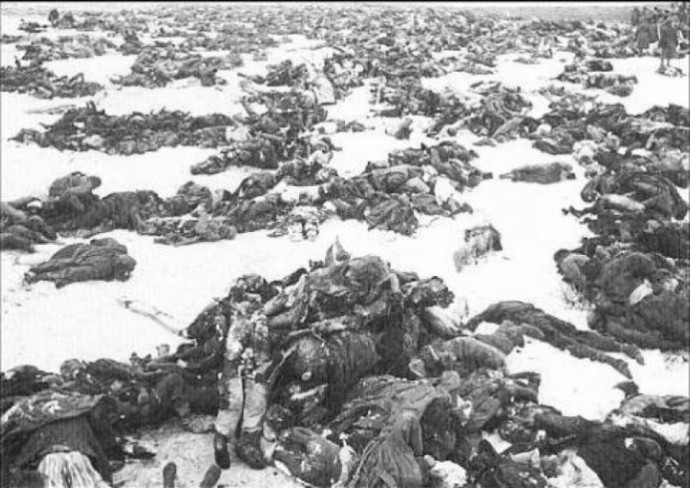
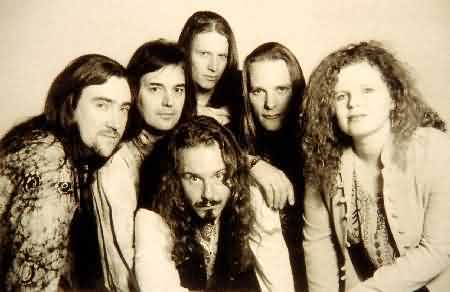
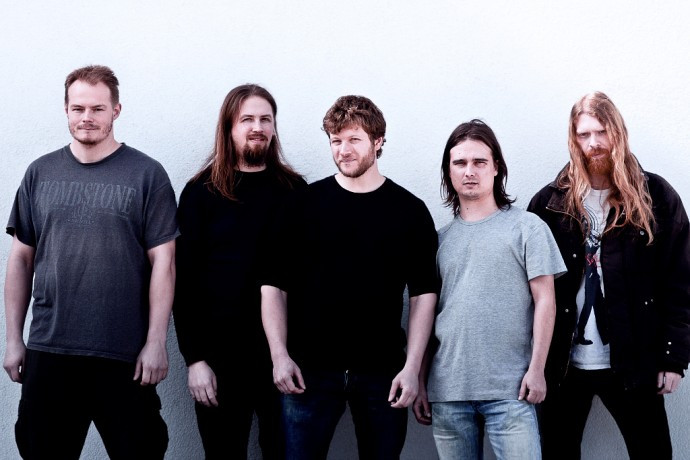
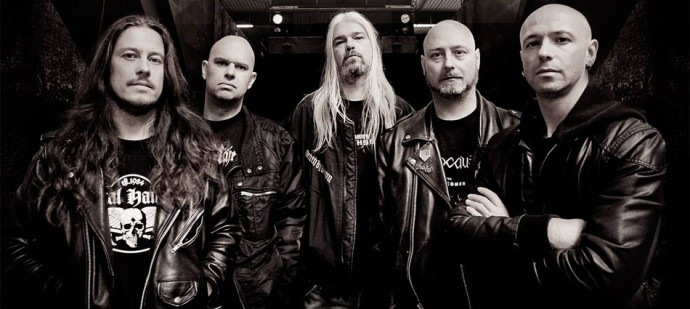
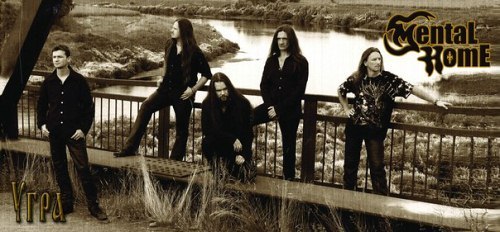
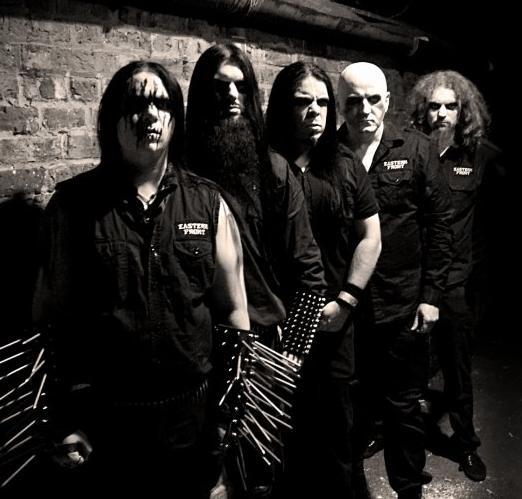
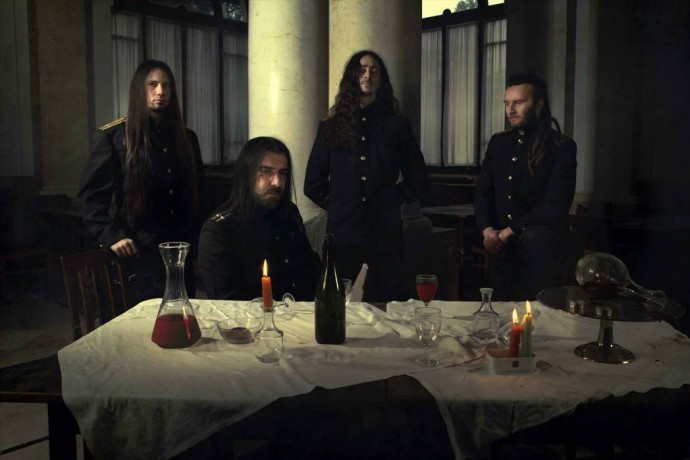
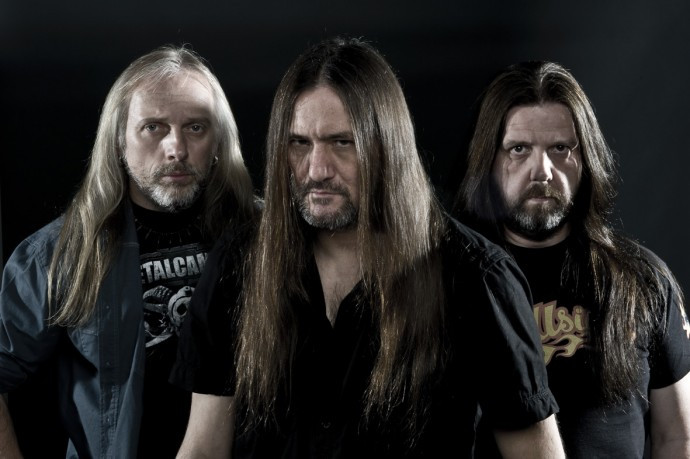
I haven’t had time to make it all the way through this, but before I shoot off to work I just wanted to say: this is a fucking great post!
Not enough Marduk.
This is an excellent piece, incredibly well written and very engrossing. I’m really looking forward to the next installment. I’m no expert on World War II, by any stretch of the imagination, but I’ve always found it to be fascinating. The sheer scope of the war, the unbelievable death toll, and the atrocities that occurred. It just seems to horrific to be real for someone like me. I can’t even imagine what it must have been like for young people of that time to be thrust into such a nightmarish struggle. I’ll probably never experience anything like it in my lifetime.
Thanks Derek! I need to say (and Islander noted that links), that I used a lot pieces from Wikipedia. English isn’t mother tongue for me, so it could take much more time without it. I had an idea to use also quotes from my grandfather diary but it will take even more time.
For me, a big part of why this was so fascinating was the knowledge that it was written by someone whose ancestors lived through the horrors of the Eastern Front. In the U.S., it’s a little-known subject because we did not fight there. Though our soldiers made great sacrifices, the fact is that WW II never visited our shores as it did the countries of Europe and elsewhere in the world, and that’s a huge difference. Actually, much of what I know about the Eastern Front has come through music written about it, and you have added to that library.
Marduk will be included in pt.II.
I try to keep some chronological order.
Incredible post Comrade Aleks, well-researched, well-written and fascinating. With some great music tips. I’ve previously only been familiar with Sodom, Hail of bullets and Skyclad. Lookign forward to part 2!
Really cool post to delve into – thanks for writing it.
Great post. I’ve always been fascinated with World War II and what I do come across usually has more to do with the U.S involvement more than anything else. Reading or watching documentaries about regions pre 1942 and even the Eastern Front can be an eye opener on just how large the scope of the War really was. So seeing recommendations about music tying into this material that isn’t Sabaton or in addition to Hail of Bullets is pretty cool.
I dig that Altar of Oblivion tune so I’ll have to check out more of their stuff. Good job, dude ! 🙂
Great article and extremely glad you wrote this. I’ve always had this fascination for World War II, especially a lot for the great sacrifices involved and the WWII weaponry that was at display. Probably that is why a lot of metal does broach upon the subject. A strange dichotomy of immense loss and unbridled valor and all kinds of tech just to wipe people off the face of the earth. Contradiction lies at the heart of all human condition.
The Eastern Front probably saw the greatest theater of battle ever. Having said that, a few months back I was reading Anthony Peevor’s book on Stalingrad, ‘Stalingrad : The Fateful Siege 1942-1943’. Highly recommend it for it perfectly highlights the atrocities committed by both sides in equal measure. It throws up a lot of interesting facts on the resistance and the comeback as well. Like Stalingrad had something brilliant called the ‘Stalingrad Academy of Street Fighting’, a kickass form of guerilla warfare that fought door to door and used the surroundings (mostly bombed out rubble) to full effect. I never knew Sodom had a song on Katyusha rockets, thanks for letting me know. One could only imagine those salvos of Katyusha rocket fire instilling fear into many a German heart, so much so they equated the sound of them being fired to Stalin playing an organ. https://www.youtube.com/watch?v=u4ntSKVPiJ4
Since my part of the country, had communist party governments (different from the soviet brand though) the reference to Russia has been quite strong. I was reminded of an extremely small eatery frequented by people of the working classes called Volga, which I used to frequent for lunch. It’s obvious where they got that name from. Thanks for this again. Looking forward to the next one.
Thank you all comardes!
I hope that parts II and III will be interesting enough to read and listen.
Heavy Metal about military history is the virtually the only music I find interesting anymore.